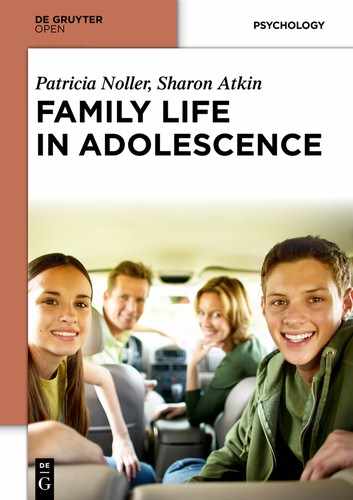Preface
Many parents fear the time when their beautiful happy children will become adolescents. Because of the continual media attention given to a small group of adolescents who engage in risky or destructive behaviour, many seem to believe that every adolescent is out of control and that all parents are likely to have a terrible time trying to manage them. Yet, this is far from the truth.
As the large amount of research reported in this book shows, most adolescents are responsible young people who care about their families and crave the support of their family members, particularly their parents. We also show that how parents behave towards their adolescents is critical to their wellbeing. Are parents prepared to set limits on their adolescents? Do they expect them to behave responsibly? Are they warm and caring in their relationships with their adolescents or are they controlling and critical towards them? The answers to these questions are crucial to how young people are likely to develop. We also believe, on the basis of research that adolescence builds on earlier experiences in the family. In other words, children who have experienced positive, caring relationships with their parents are likely to become responsible adolescents.
Because we are both psychologists, we focus on these research findings. We acknowledge that we have emphasized psychological research, most of which has been carried out using quantitative data, although we have also included qualitative research. Because psychology is such a broad discipline, the research has been carried out by psychologists working from a range of perspectives including those of social psychologists, clinical psychologists, developmental psychologists and health psychologists. Despite our tendency to focus on our own discipline, we have also included studies carried out by researchers in communication, family studies, sociology, psychiatry and criminology. The research, as we have interpreted it, indicates that a well-functioning nuclear family (with two biological parents) is overall the best environment for children, although it is not always possible for a range of reasons. We realise that there are families of all forms that produce competent and happy adolescents, but also recognise that nonnuclear families are more likely to struggle due to a range of circumstances including access to resources.
In this book, we focus on a number of family types, although we also acknowledge that we have omitted a discussion of the large body of research on adoptive and foster families. We believe that these are huge and complex areas that need a specific focus rather than just being part of a more general treatment of families with adolescents. Of course, the issues discussed in this book are also relevant for these types of families.
Although the positive psychology movement is important in that it argues for focusing on the strengths of adolescents and against negative stereotypes, it is also clear to us that there are a lot of potential traps for adolescents that need to be acknowledged and discussed. There is also a great deal of research around the problems that some adolescents experience. In general, a relatively small proportion of adolescents are involved in problem behaviours, but the effects of some of these potential traps can be devastating to the lives of those adolescents involved and their families.
Because of the large amount of research discussed in this book, we believe it will be useful to social workers, youth leaders, teachers, welfare workers, religious leaders, psychologists and psychiatrists, in fact anyone who comes into regular contact with adolescents. Although we have not been able in the space provided to cover all the research that has been carried out, even in the last decade, we hope that our overview will contribute to a better understanding of young people and their development and the importance of families to that development.
Patricia Noller Ph.D
Sharon Atkin Ph.D
